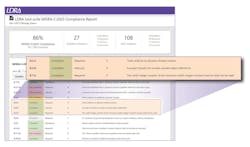LDRA software design and development tools add MISRA C:2023 guidelines to static code analysis capabilities
WIRRAL, England – LDRA in Wirral, England, is introducing the latest MISRA C:2023 guidelines to the static code analysis and reporting capabilities of the company's LDRA tool suite.
LDRA’s new design and development tools capabilities support embedded developers identify and mitigate potentially dangerous code in increasingly complex and difficult-to-test multithreaded, multi-processor systems in aerospace, defense, industrial, energy, medical device, and automotive applications.
Introduced in 1998, MISRA C is the standard for developing software in the C programming language where safety, security and code quality are essential. The MISRA C Working Group has announced MISRA C:2012 Amendment 4 (AMD4).
This specifies rules and directives for multithreading and atomic types as well as clarifications on existing guidance to align with how developers use the C language today.
The group also has introduced MISRA C:2023, which consolidates previous versions of the guidelines into one edition to facilitate compliance.
MISRA C guidelines recommend using static analysis tools to validate code against its rules and directives. With support for all versions of the MISRA guidelines, the LDRA tool suite employs static analysis to identify areas of non-conformant code to aid documentation and modification.
The software-development tool also includes reports and graphical displays to enhance understanding of the source code in line with MISRA guidelines. It also facilitates structural coverage analysis to ensure developers can measure and maintain the amount of tested code, as recommended by the MISRA guidelines.
For more information contact LDRA online at www.ldra.com.
